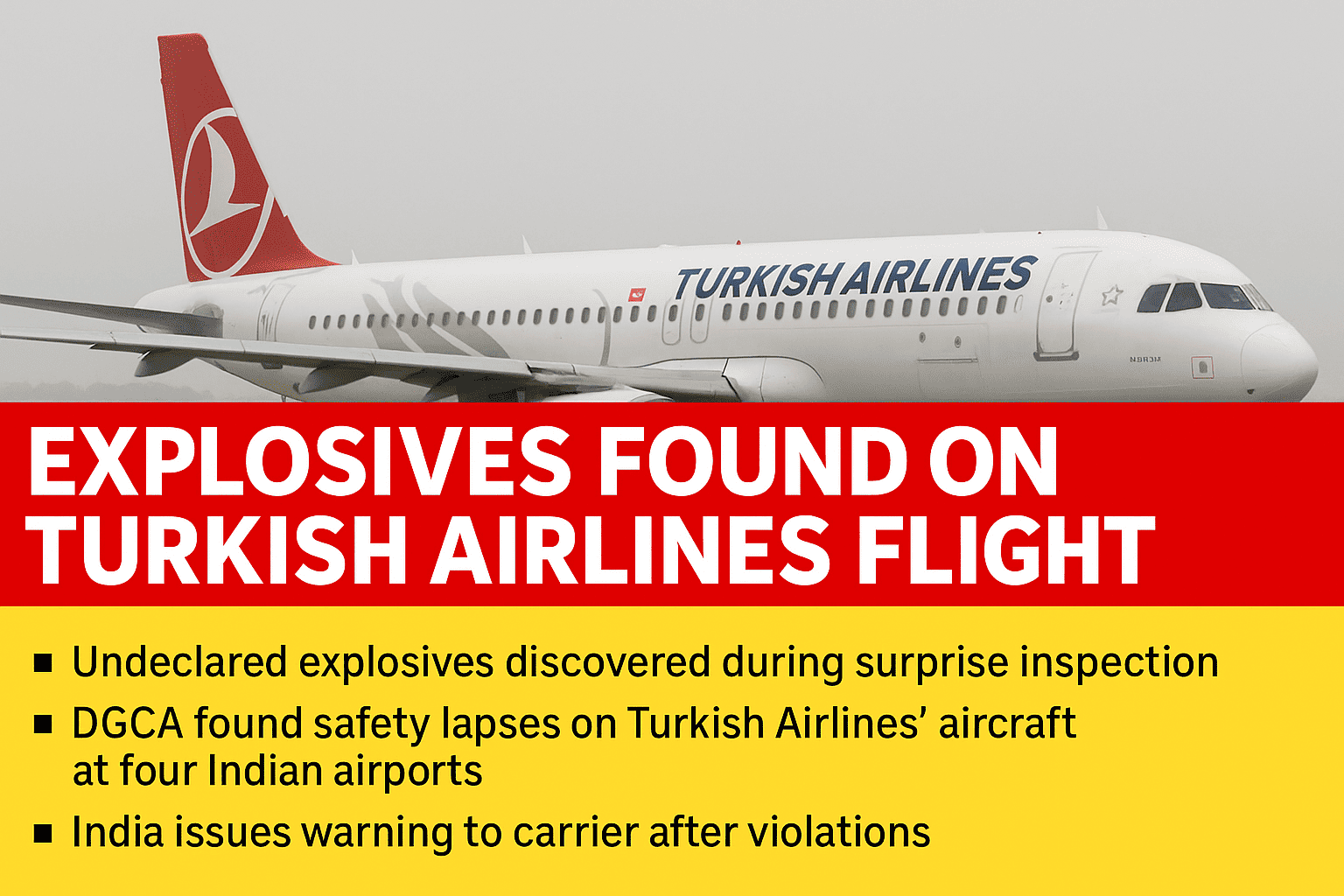Explosives Found on Turkish Airlines Plane During Surprise Check: India Issues Stern Warning
By Shylesh | New Delhi | June 5, 2025
In a dramatic escalation of aviation safety concerns, Indian authorities have issued a formal warning to Turkish Airlines after a surprise inspection of its aircraft across four major airports uncovered serious safety violations — including the unauthorized carriage of explosive materials on at least one flight.
The findings have sparked alarm across civil aviation circles and heightened diplomatic scrutiny between India and Turkey, as the Directorate General of Civil Aviation (DGCA) pushes for immediate corrective action from the carrier, warning of potential operational consequences if compliance gaps persist.
 What Happened: The Explosive Discovery
What Happened: The Explosive Discovery
According to sources within the DGCA, the inspections were conducted as part of an unannounced multi-airport audit over the past 10 days. The checks targeted inbound and outbound Turkish Airlines flights at Delhi, Mumbai, Hyderabad, and Bengaluru airports, following what officials described as “intelligence-driven red flags.”
During one such inspection at Indira Gandhi International Airport, New Delhi, security personnel discovered undeclared Class 1 explosive cargo — believed to be pyrotechnic material — in the belly hold of a Turkish Airlines aircraft. The item had no prior disclosure in the airline’s cargo manifest, violating Indian aviation safety and security laws under ICAO and DGCA guidelines.
A senior DGCA official, speaking under condition of anonymity, confirmed:
“The airline failed to follow established dangerous goods handling procedures. This is not a clerical oversight; it’s a severe breach with national security implications.”
Other Findings: A Pattern of Lapses
The incident involving undeclared explosives was just the most serious among several lapses uncovered during the inspections. The DGCA’s audit also found:
-
Incomplete cargo documentation on multiple flights.
-
Improperly secured cargo pallets that posed in-flight hazard risks.
-
Lack of mandatory staff certifications for ground handling operations in India.
-
Non-functional emergency communication equipment onboard two aircraft.
These violations suggest systemic oversight rather than isolated errors, prompting aviation analysts to question the airline’s current operational standards within Indian airspace.
India Responds: A Formal Warning and Tightened Scrutiny
In response, the DGCA issued a compliance directive to Turkish Airlines, demanding immediate corrective measures, full disclosure of dangerous goods protocols, and enhanced staff training documentation. The letter also warns that failure to comply within 10 days could result in suspension of certain flight clearances or revocation of cargo privileges on Indian routes.
The Ministry of Civil Aviation has also been briefed and is considering a broader review of all foreign carriers operating cargo via Indian airports.
“We welcome foreign carriers, but not at the cost of safety,” said Union Civil Aviation Minister Jyotiraditya Scindia. “India will not compromise on international air safety norms, regardless of the operator’s flag.”
Turkish Airlines Responds
Turkish Airlines has acknowledged the incident but called it a “documentation oversight”, issuing a statement that reads:
“We are cooperating fully with Indian authorities to review the matter. Turkish Airlines prioritizes the safety of its passengers and partners, and we are conducting an internal audit to reinforce compliance.”
However, aviation regulators in Turkey have yet to publicly comment, and diplomatic sources say the Turkish embassy in New Delhi has requested further clarification from the DGCA.
Security Ramifications: Dangerous Goods & Airspace Risks
Aviation experts warn that any mishandling of explosives — even unarmed — poses catastrophic potential during commercial flights. The undeclared cargo was flagged as “hazardous but not immediately volatile”, but its mere presence raises questions about how the material boarded a commercial aircraft unnoticed.
Under ICAO Annex 18, airlines are legally required to classify, declare, and secure any dangerous goods prior to acceptance. India, a signatory to the ICAO framework, mandates strict screening protocols, especially for items falling under UN Hazard Classes.
“Had this aircraft faced turbulence or pressurization issues, the consequences could have been disastrous,” said former Air India captain and aviation safety analyst, R.P. Chauhan.
Passenger and Airport Reaction
The incident has left passengers uneasy. Turkish Airlines is a popular choice for Indian travelers to Europe and North America, with daily flights from Delhi, Mumbai, and Bengaluru. Many have taken to social media demanding transparency and reassurances.
Indira Gandhi International Airport (IGIA) has stepped up secondary screening procedures for all international cargo flights post-incident.
Bigger Picture: Aviation Safety in an Era of Rising Cargo Risk
With global air cargo volumes on the rise post-pandemic, aviation authorities worldwide are under pressure to re-evaluate oversight mechanisms, especially for foreign carriers. India’s stance in this case signals a zero-tolerance policy as it aims to balance international aviation relations with non-negotiable security standards.
If the issue is not resolved quickly, it may also impact Turkish Airlines’ bilateral air traffic rights, which allow it to operate cargo and passenger services to over 5 Indian cities.
Conclusion: A Warning Shot to the Skies
This incident is not just a regulatory blip — it’s a wake-up call. As Indian skies grow busier and international carriers increase frequency, the margin for error in aviation safety is virtually zero.
The DGCA’s response may set a precedent for more stringent inspections and penalties across the board. For Turkish Airlines, this is a reputational test with global ramifications. For India, it's an assertion of sovereignty in safeguarding its skies — and its people.